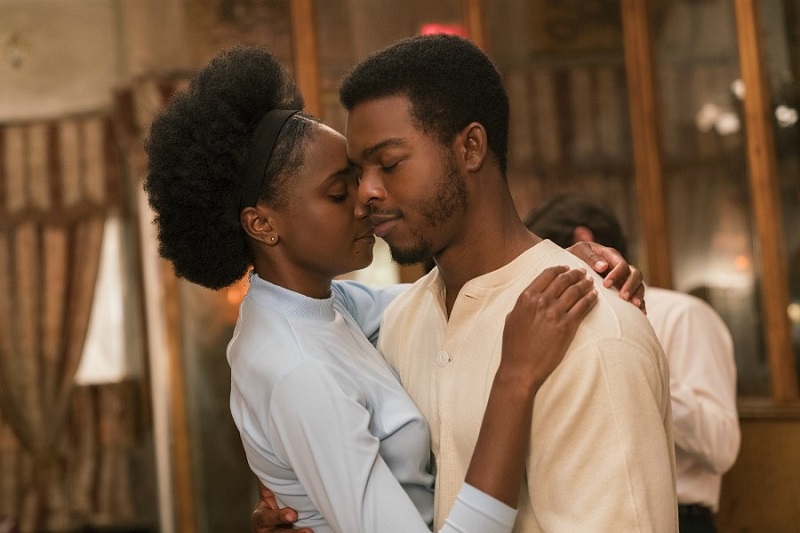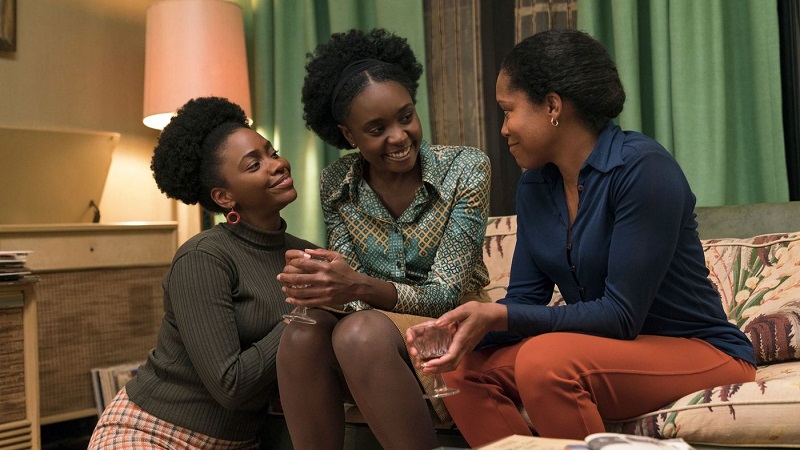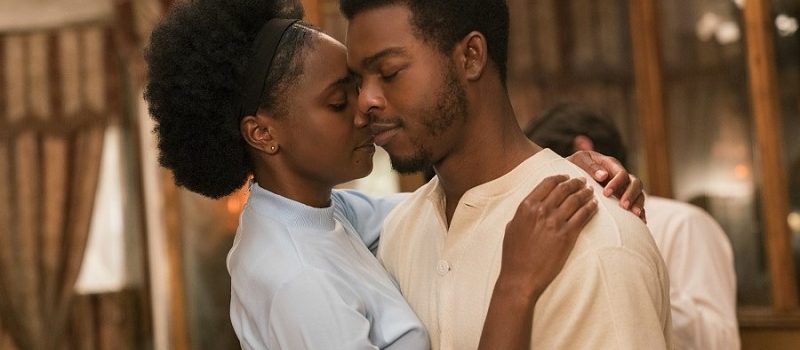Barry Jenkins is one incredible storyteller whose panorama is lush with beautiful colored tones, rich musical score and actors uttering prose that would make Shakespeare proud. He achieved that in droves and won Best Picture with Moonlight and now he’s back bringing James Baldwin’s book If Beale Street Could Talk to brilliant life on the silver screen.

The film is remarkable on many fronts. Initially what is so striking is how there are many scenes that audiences will simply want to bask in, never letting them go and unwilling to go forward for fear of the beauty—however raw and real—should abate before the next scene commences. Then, the story progresses further and another blissfully beautiful moment arrives that heavenly carries us through to the next. Now, keep in mind, this is all while we are witnessing a tale of a couple, Fonny (Stephan James) and Tish (KiKi Layne), who are madly in love and expecting their first child. They must navigate the early 70s justice system of New York City that has Fonny locked upon a charge he didn’t commit.
Seeing these two, ever slowly, but still assuredly, falling for each other, Jenkins establishes their love affair by crisscrossing time going from quick images of them as little kid best friends to adults on the cusp of a romantic awakening to full blown passionate love for the ages. Their parents are thrilled (save Mrs. Hunt, Fonny’s mom) at the news of an incoming baby from these two lovebirds and their acceptance includes the idea that there is a life coming into this world that had nothing to do with the daily struggles that the family and the couple are enduring. Therefore, it deserves all the love and all the opportunities a fresh life has afforded to them.
First things first, they must do what they can to get Fonny out of jail on this trumped up charge. There is police corruption at play and a witness who has left town, so hope is slim. What is astonishing in If Beale Street Could Talk is that there is no shortage of optimism, hope and belief that everything happens for a reason—i.e. God has a plan for us all. It is that unending courage from all involved that permeates the screen and washes over the audience. We feel it, to our core. Don’t be surprised, that even though there are incredibly tragic moments that befall our film friends, that after the credits roll one is emboldened with a sense that if love is at its fullest, there is nothing we can handle.
Layne and James are a revelation. Their characters are not merely three-dimensional, they transcend the medium of film. Tish and Fonny live and breathe, from what Jenkins has delivered to us, and as such their pain, their joy, their passion and their eternal hope is ours as well. It is an astonishing achievement when a film can not only touch our hearts but pierce our souls. Layne has a wide-eyed element to her that delivers a sense of awe to everything that happens to her and Fonny. She’s no doe-eyed innocent by any means. Tish is portrayed as strong as they come, something extraordinary given that she is only 19-years-old. Yet in the hands of Layne, her character is taking on the gifts of life (her pregnancy and her love with Fonny) along with the terrible tribulations (Fonny’s corrupt cop incarceration) in stride in a manner that is a lesson for us all. There is something to be said for eternal optimism in the face of a society who has staked all the cards against you.

James embodies Fonny with an assuredness that hides an uncertainty about life, given what black men must endure on a daily basis. That is something that Jenkins paints all to perfectly with black and white images from the past, along with Tish’s narration of what amounts to a truth that no one likes to talk about. This is early 70s New York City, but in many ways, it could be 2018 and that is not by accident from a filmmaker where each narrative and visual decision is about as on purpose as it can be. With James bringing Jenkins’ protagonist to life, we see an artisan who is doing the best he can, and then some. His woodworking is the stuff of beauty, and that mirrors his blind and total adoration for Trish. Like I said, it is simply beautiful.
An extraordinary turn is delivered by Regina Hall as Tish’s mom, Sharon Rivers. She is everything one would want in a maternal influence and so much more. There is a kindness, but there is also a fierceness that one can see how the apple did not fall far from the tree. Hall, once again, shows that she is a thespian firecracker who is equally capable of exploding when called for and bottling up her power for a piercing motherly moment of the most endearing kind. All this Oscar buzz for King is beyond deserved and if she is not called come January, it will be one of my biggest snubs.
Then there is the gifted auteur that is Jenkins. In only his third major film, he firmly delivers a blueprint of what we can expect from a “Barry Jenkins film.” There is unbridled beauty, a narrative pace that is slow—yet deliberate—and it is all delivered in a manner that is sonically succulent, visually sublime and emotionally electric, touching every emotion on the human spectrum. This is achieved while an underlying reality exists that the system is rigged, there is darkness in the African-American community that is hundreds of years in the making and one that shows no signs of slowing down—even as progress has been made. Whether it the early 70s of If Beale Street Could Talk or 2018 reality, there are far too many black souls behind bars and in our justice system than their racial counterparts.

They always say that the best way to get across a stern message about a societal ill that is not easy to talk about is to do it in a manner where the listener/viewer has no idea that they are being enlightened while they are entertained. With If Beale Street Could Talk, Jenkins does just that… and it is glorious, gorgeous and sadly, wholeheartedly tragic.
Grade: A

